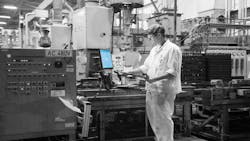Global economic uncertainty has divided the manufacturing sector into one of two camps: those producers who are growing despite the unpredictable economic climate and those who have scaled back. Both are waiting for the market to calm down but how long that may take is a big question mark.
Regardless of which camp you find your company in, the current economy leaves you with one goal: become more nimble to seize market opportunities. And you can take action now by adjusting your ERP strategy to increase agility, decrease complexity, and leverage the benefits of cloud computing.
Manufacturers Need Operational Efficiency—It’s Vital for a Healthy Business
Your traditional ERP system may actually be a bigger threat to your profitability than overseas economic fluctuations. Many ERP vendors have chosen to match their competitor’s offerings by adding layer upon layer of disjointed features with little regard to how customers will actually use them. Between data center operations and system maintenance, IT departments spend 70-80 percent of their budgets just keeping the lights on.
Because a true cloud ERP system is delivered over the web, there is no hardware to buy. The software lives in a cloud-based data center where highly trained IT professionals take care of the maintenance, upkeep, concurrency, and security issues—so you don’t have to. Implementation time is nearly eliminated because true cloud ERP is provided as a service. You benefit from the software sooner than your company ever could with time-consuming on-premises installation. Shortening payback periods almost always results in greater production ROI.
Manufacturers Need a Connected Enterprise
To beat their competitors in the ERP features race, most vendors “bolt on” modules that were never designed to work together. This means you are are forced to hire outside consultants to integrate your ERP’s disjointed outputs into a data set useful enough to manage—and custom integration adds another layer of complexity, but without it, managers can’t improve operations, nor can executives lead your company.
Connectivity doesn’t stop at your company firewalls. Your customers, suppliers, and partners need access to production data to streamline purchase orders and inventory shipments. Native cloud ERP shields you from time-devouring details of connecting dissimilar module interfaces, simplifying ERP operations at all levels.
Data is available from your plant floor to the top floor, connecting your people with processes and enhancing enterprise command and control. Cloud ERP systems have been developed for mobility from the outset to ensure that users get the enterprise-wide data they need wherever they are, regardless of device.
Manufacturers Need Visibility and Insight
Data is only useful when you can make connections to generate a clear picture of what is really happening on the plant floor. Legacy systems simply can’t give production leaders the data they need when they need it. In the event of an inventory control problem, systems can’t drill down for more granular data, leaving managers to piece together outputs from a labyrinth of dissimilar screens. By the time managers finally acquire all the data points they need, the time for action may have already passed. And if your inventory has a limited shelf life—that could result in costly waste.
The cloud breaks down data silos that plague conventional ERP. Report developers don’t have to span multiple third-party modules for their source data; everything they need lives in the core ERP with easily accessible connection points. Your managers can see all the pertinent data they need as soon as they log in. No extra clicks or code required. A true cloud ERP system puts seamless real-time data into managers’ hands faster, enabling them to make better and timelier decisions. By presenting one centralized source of truth throughout all your plants around the globe, executives, managers, and line employees operate on the same real-time data set without the latency that plagues traditional systems.
Manufacturers Need Process Automation and Ease of Use
ERP systems are supposed to relieve you from tedious, error-prone, paper-centric processes however many conventional ERP vendors completely omit commonly needed manufacturing functions. Relying on third-party bolt-on modules to deliver core ERP functionality is a recipe for a sluggish, unreliable system.
Cloud ERP for manufacturing designs every manufacturing component as a priority with all other components. And for the occasional need that can’t be anticipated, architects provide intuitive API hooks for easy extensibility. The entire ERP system is delivered over the web and accessed in a browser so there is no tedious upgrade process or system downtime. The latest features are ready to use with a simple browser refresh or as an opt-in so you only enable only those features you actually want versus being forced to take features you don’t want.
Your users also benefit from the simplicity of cloud ERP. The look and feel they experience in the plant floor module is the same one they’ll see in the accounting and inventory functions. Simple and consistent human interfaces increase employee adoption while decreasing user frustration and training costs.
Manufacturing Cloud ERP: The Simple Answer to Complex ERP
Complexity is the enemy in an uncertain economy—when it is inherent in the systems that run your business, it becomes a liability. Taking a hard look at your legacy ERP system is a start. Is it driving simplicity or making operations more complex? Are you investing in more maintenance just to function as opposed to updates that deliver innovation? Can you get a comprehensive view of plant floor performance from your top floor? If not, you may be in that group that is scaling back just to survive. But you don’t have to stay there. Smart manufacturers have simplified their operations with a true cloud manufacturing ERP system that enables them to thrive, even in an uncertain global economy.
